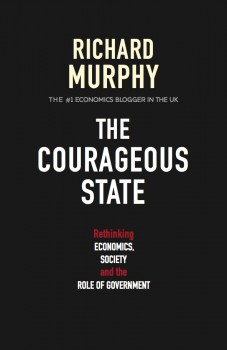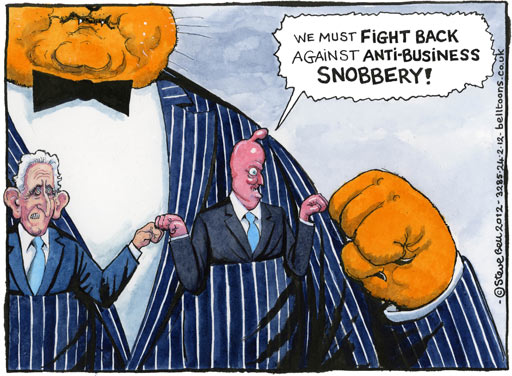
Having flirted with 'moral capitalism' (whatever that means), Cameron said he was "sick" of "the snobbery that says business has no inherent moral worth like the state does".
It's been a bad year for big business - not generally in the bottom line: profit margins are doing reasonably well - but, as I told the Morning Star:
"Big business has been rightly pilloried of late for dodging taxes, paying excessive bonuses, rampant profiteering, and now exploiting the unemployed through workfare.By contrast, David Cameron called on "those of us who believe in markets, business and enterprise" to "fight this mood with all we've got."
"Cameron's speech is a reaction to the inevitable public distrust and growing anger with his government handing over our schools, welfare system and the NHS to big business.
"Activists should be proud that we have forced the government on the defensive - and keep up the pressure!"
Twitter and Facebook have proved effective at both naming and shaming abuses, and are in organising high street protests. Even the Daily Mail and Telegraph have published articles critical of mandatory forced labour.
Cameron's words mean we can expect a concerted onslaught from the governing parties and the old media - mostly reliant on corporate advertising or donations - to convince us that big corporations are rather benevolent institutions.
In Richard Murphy's The Courageous State there is a riposte to Mr Cameron: a 20-point charter setting out that "a good business":

- Makes clear who it is so people know who they are dealing with
- Makes clear who runs it
- Makes clear who owns it
- Makes clear the rules by which it is managed
- Puts its accounts on public record if it enjoys limited liability, and does so wherever it is incorporated whether required to by law or not
- Seeks to comply with all regulation that applies to it
- Seeks to pay the right amount of tax due on the profits it makes in the place where they are really earned and at the time they really arise
- Seeks to pay a living wage or more to all who work for it
- Recognises trade union rights
- Operates a fair pay policy so that the pay differential between the highest and lowest paid in the company cannot exceed an agreed ratio that should never exceed twenty
- Makes fair pension provision for all employees
- Does not discriminate between employers on the basis of race, nationality, national origin, gender, sexual orientation, age, disability, and similar such issues
- Does not abuse the environment
- Has a clear code of ethics that it publishes and is seen to uphold
- Is transparent in its dealings with customers
- Seeks at all times to minimise risk to those it deals with and takes all steps to ensure they know what those risks are
- Accepts responsibility for its failings and remedies them
- Works in partnership with its suppliers and does not abuse them
- Advertises responsibly
- Creates and supplies products meeting real human need
Don't expect Cameron to be writing this charter into corporate law any time soon.
Update: Great Steve Bell cartoon ton today's Guardian

No comments:
Post a Comment